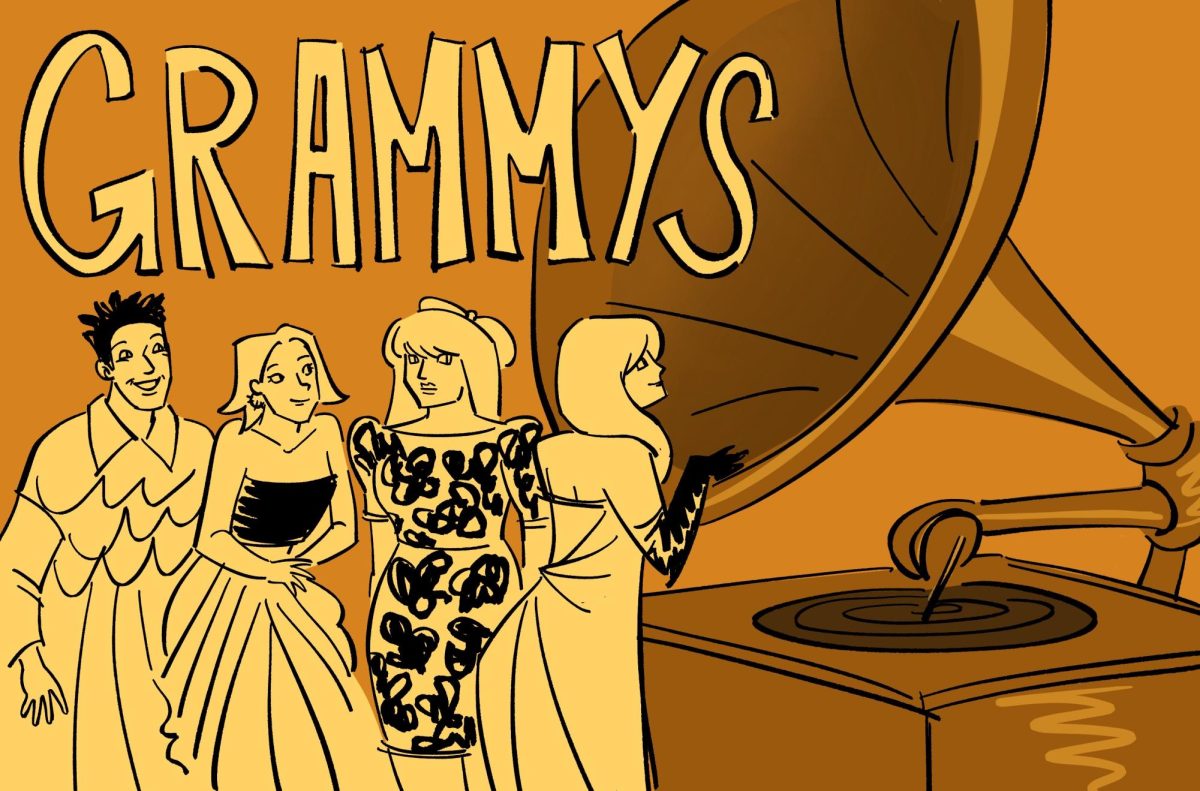The 66th Annual Grammy Awards Ceremony.
Miss America’s sweetheart, the golden child for pale suburban millennials, takes away her 14th Grammy Award. The 34-year-old woman, still singing about heartache and men, breaks the Ceremony’s record, congratulating Swift with her fourth Album of the Year award, and the culture– everyone besides the Swifties– is mad.
Her winning was obvious, not in her talent, but her clique. Swift has amassed a reputation of an intense fandom, a girlish-esque following that grows alongside the icon’s transformation and flux within the genres.
Her ghastly 2011 style: her swept side bangs, the peep-toed heel, the necklaces, her red lip, was all entirely too much. She’s the kind of woman to snub Céline Dion, drag her losing candidate on stage, and use her acceptance speech time to promote her upcoming album, which she did do.
The white mediocrity trope that has persisted in the Grammys’ history, that will persist in awarding underwhelming white artistry, combs the kink off Black bodies in their pursuit of unbiased representation.
This fixed salutation of whiteness, and complimenting only black excellence is tired and slowly flexible. And even as Swift stood there and recognized that the way that “the recording academy voted is a direct reflection of the passion of the fans,” this wasn’t at all true.
“SOS,” SZA’s acclaimed project, the fifth-largest album debut of 2022, topped the Billboard 200 for 10 weeks, which had been greater than all the other artists nominated in that same category. But even with the longest-running #1 female album of the decade, she lost.
Accepting the Dr. Dre Global Impact Award at the Grammys that night, Jay-Z criticized the Recording Academy and acknowledged the inconsistencies in its awarding system during his speech.
“Some of you are going to go home tonight and feel like you’ve been robbed. Some of you may get robbed. Some of you don’t belong in the category…We just want y’all to get it right.We love y’all, we love y’all, we love y’all, we want y’all to get it right. At least get it closer to right. And obviously, it’s subjective… it’s subjective because you know, it’s music and it’s opinion-based,” Jay-Z said.
The 54-year-old rapper goes on to unwrap the confusion of what the Ceremony defines success to look like, using his wife, Beyoncé, as an example.
“I don’t want to embarrass this young lady, but she has more Grammys than everyone and never won album of the year. So, even by your own metrics, that doesn’t work. Think about that. The most Grammys– never won album of the year,” Jay-Z said.
Beyoncé currently holds the record for the most Grammy nominations, totaling 88 by 2023.
“But outside of that, we gotta keep showing up… Keep showing up until they give you all those accolades you feel you deserve. Until they call you chairman, until they call you genius, until they call you the greatest of all time,” Jay-Z said.
To every Black artist that has been commended with a recognition of their sublime, the award doesn’t stand for them alone. There’s no selfishness in honing a trophy representing the progression of a culture, the transgression into a newer state of wakefulness.
In an effort to diversify African showcase, the Recording Academy awarded South African singer, Tyla, in the Inaugural Best African Music Performance Category.
The young female artist, whose popularity had fastly escalated because of her lead single, “Water,” which will appear on her upcoming self-titled album in March, had mixed Western pop influences with familiar sounding Afrobeats and amapiano. Her success fosters an embrace of African vitality and marks another step in establishing active black talent.
These achievements are not meant to suppress whiteness or lessen the talents of any group, simply that the industry needs more Black representation on screen. This myriad of the champions of Black excellence demands to be heard, those who will break their necks to perform greatness and be dimly recognized as petty. This societal program is working to arrest the purge on the spectacles of blackness. It seeks to give sound to African musicians, but that progression is only just happening.











